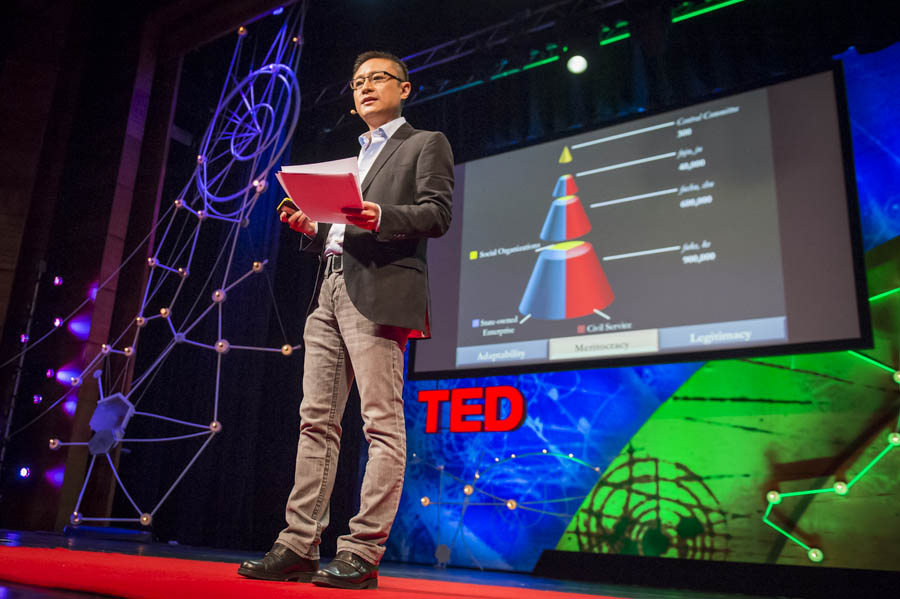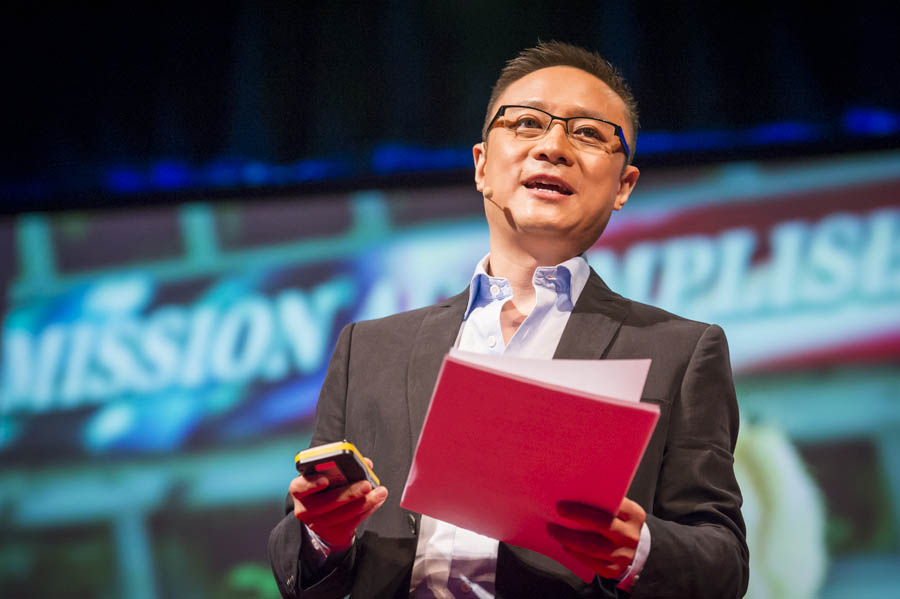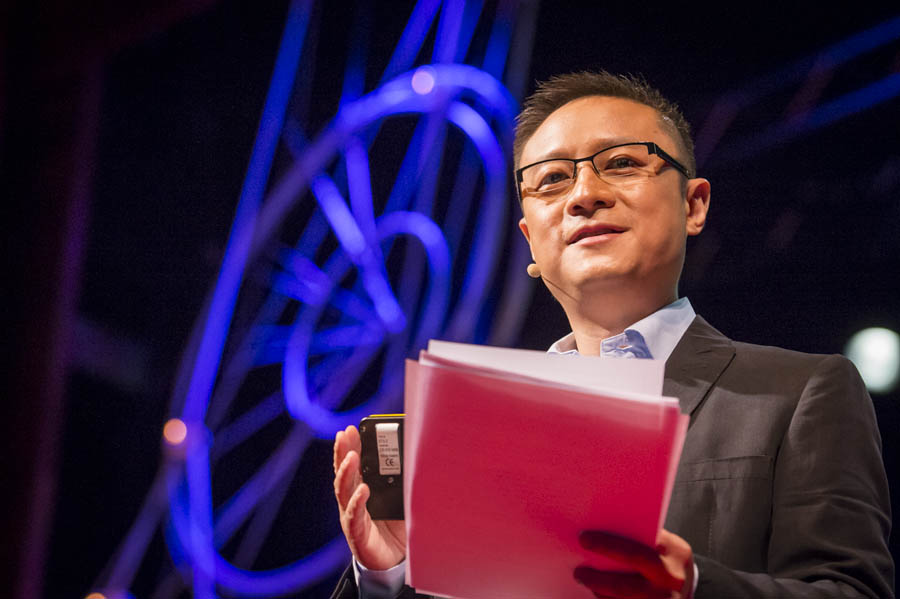Born in Shanghai in 1968, at the height of the Cultural Revolution, Eric X. Li grew up hearing a story: All human societies develop in linear progression, beginning with primitive society, moving through capitalism to socialism and, finally, Communism. Sooner or later, all of humanity, regardless of creed or culture, will reach that final stage of political and social development. The world’s peoples will be unified in this paradise on Earth and live happily ever after. Meanwhile, we are engaged in a struggle between the good of socialism and the evil of capitalism. One third of the world’s population lived under this meta-narrative, distilled from the theories of Karl Marx. The story was a best-seller. “We were taught that story day in day out,” says Li. “It was part of us, and we believed it.”
But then, he says, showing a slide of Gorbachev and Yeltsin, the world changed overnight. “Disillusioned by the failed religion of my youth, I went to America and became a Berkeley hippie.”
There, as he came of age, Li was told another story, one where all human societies, regardless of creed or language, develop in linear progression, progressing from traditional societies where groups form the basic units to modern societies in which atomized individuals are the sovereign units. And they all want one thing — the vote. With the vote, they produce good government and live happily ever after — paradise on Earth. Sooner or later, electoral democracy will be the only political system for all countries and all peoples, with a free market to make them all rich. Meanwhile, we are engaged in a struggle of good against evil. Good belongs to those who are democracies, charged with the mission of spreading it around the globe — sometimes by force — against the evil of those who do not hold elections.
This story was also a best-seller: according to the Freedom House, the number of countries practicing electoral democracy grew from 45 in 1970 to 115 in 2010. Today, says Li, Western elites endlessly trot this prospectus around the globe as the path to salvation for the long-suffering developing world.
Li, now a venture capitalist based in Shanghai, considered these meta-narratives and compared them to his experience of childhood in China, living on food stamps, versus his experience in the city now — entrepreneurship booming, a fast-growing middle class. In 30 years, China has gone from one of the poorest agricultural countries to the world’s second largest economy — and 80% of the world’s poverty alleviation during this period happened in China.
“So I asked myself, what’s wrong with this picture?” According to the metanarrative, none of this should be happening, Li says. “So I did the only thing I can do: I studied it.”
What he found punches holes in our assumptions about China’s limitations. People think that the one-party system must be operationally rigid, politically closed, morally illegitimate. In fact, he argues, the opposite is true: what defines China’s one-party system are adaptability, meritocracy and legitimacy.
1. Adaptability: Political scientists say that one-party systems are incapable of self-correction. Li counters this with the fact that the Party has self-corrected dramatically in the last 64 years, more than any other country in recent memory. The Party’s policies encompassed land collectivization, the Great Leap Forward, the Cultural Revolution, Deng Xiaoping’s market reforms, and Jiang Zemin opening Party membership to private businesspeople — “something unimaginable during Mao’s rule.” And the Party self-corrects in dramatic fashion. New rules get enacted to correct past mistakes, such as term limits with mandatory retirement rates. We also often hear that China is in dire need of political reform, but Li argues this is rhetoric — even if critics don’t see the reform they want to see, political reforms have never stopped. Chinese society is unrecognizable today as compared to 30 years ago. In fact, Li says, “I would venture to suggest that the Party is world’s leading expert in political reform.”
2. Meritocracy Another assumption is that one-party rule leads to a closed political system in which power gets concentrated in the hands of the few, leading to bad governance and corruption. Li argues that actually, the Party is one of the most meritocratic political institutions in the world. Only one fifth of Politburo members come from privileged backgrounds, and in the Central Committee of more than 300, the percentage is even smaller. This is thanks to a body little known to Westerners — the Party’s Organization Department system that guides candidates through integrated career tracks for Chinese officials, recruiting college graduates into entry-level positions and promoting them through the ranks, including high officialdom — a process requiring up to three decades. While patronage plays a role, merit is the underlying driver, says Li. “Within this system,” Li says, “and this is not a put-down — merely a statement of fact: George W. Bush and Barack Obama, before running for president, would not have made small-county chief in China’s system.”
3. Legitimacy Westerners assume that multiparty elections with universal suffrage is the only source of legitimacy. When asked how the Party justifies legitimacy, Li asks, “How about competency?” He cites the fact that since 1949 when the Party took over, China was mired in civil war and foreign aggression, and its average life expectancy was 41. Today, it’s the second largest economy in the world, an industrial powerhouse, and its people live in increasing prosperity. Pew Research polls of public attitudes suggest consistently that citizens are highly satisfied with how the country and nation are progressing. A Financial Times survey recently released suggests that 93% of China’s Generation Y are optimistic about their country’s future. Says Li: “If this isn’t legitimacy, I don’t know what is.” Contrast this, he suggests, to the dismal performance of many electoral democracies around the world: “Governments get elected and then fall below approval a few months later and stay there or fall until the next election. Democracy is becoming a perpetual cycle of ‘elect and regret.'”
Of course, Li concedes the country faces enormous challenges: pollution, population, food safety, and on the political front, corruption, which is widespread and undermines moral legitimacy. But the argument that the one-party system causes corruption doesn’t hold water. According to the Transparency International index of corruption, China has recently ranked between 70 and 80 among 170 countries and moving up, while India, the largest electoral democracy in the world, is at 95 and dropping.
Li is not out to condemn democracy. He acknowledges its role in creating the modern world. He’s not speaking against its ideals but its universal claim — the hubris — at the heart of the West’s common ills, he says. He suggests that if the West spent less time pushing their meta-narrative on others and focusing more on political reform at home, democracy might have a better chance of success.
China’s system does not pretend to be universal — it cannot be exported, says Li. But that’s the point. Neither is an alternative to supplant the other, but simply a demonstration that alternatives exist. “Let us draw to a close this era of meta-narratives,” he says. “Let’s stop telling our children there is only one way. It’s wrong, it’s boring. Let’s let universality make way for plurality. Perhaps a more interesting age is upon us.”
Eric X. Li’s talk is now available for viewing. Watch it here »



Comments (15)
Pingback: A Tale of Two Systems – Bill Totten's Weblog
Pingback: Design / Insight | Design / Insight
Pingback: I’m Concerned about the Declining Quality of TED Talks | Ministry of Harmony Ministry of Harmony
Pingback: Eric X. Li: A Tale of Two Political Systems - China Digital Times (CDT)
Pingback: Undead Astronauts » PRC apologetics
Pingback: La democrazia annoia gli innovatori democratici | Alessandra Poggiani